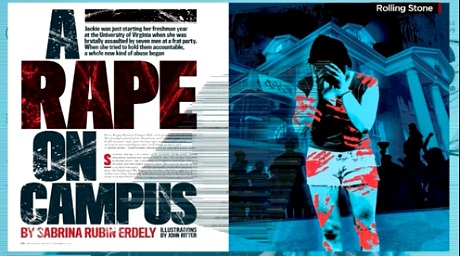Over the last 12 years there have been, by my count, three significant films about journalistic screwups at major publications, two of them concerning the N.Y. Times. 2003 saw the release of Billy Ray‘s Shattered Glass, about the exposure of several fabricated news stories by New Republic staffer Stephen Glass. Ten years later Samantha Grant‘s A Fragile Trust: Plagiarism, Power, and Jayson Blair at the New York Times, a documentary, was released. And on 4.17 Rupert Goold‘s True Story, a truth-based thriller based on a memoir by discredited N.Y. Times reporter Michael Finkel, will hit theatres. I’m now betting that within a couple of years we’ll be watching a fourth movie in this vein, one about the staggering screw-up by Rolling Stone reporter Sabrina Rubin Erdel and her editors in the UVA rape story of 2012, which has now been retracted and discredited. The Rolling Stone saga has the potential to be All The President’s Men in reverse — not a story of a liar or a plagiarist but an entire news organization turning a blind eye to basic journalistic essentials because the news story presented a politically correct legend — i.e., campus rapes are commonplace and college authorities rarely seem to do enough to adequately condemn or prevent them.

The moviegoing public will never be that interested in films about journalistic malfeasance, but Shattered Glass, at least, was a gripping, above-average melodrama about faking it in order to get ahead. It regarded an anxious American go-getter mentality that lusted for fame regardless of how that fame is achieved, and in so doing seemed to put its finger on something unsettling in the culture. In my view there’s something just as unsettling contained in the story of Rolling Stone reporter Sabrina Rubin Erdel and her editors in the reporting and almost total lack of fact-checking of the UVA “Jackie” story, which has now been retracted and discredited. It’s basically a tale of a reporter who so believed in the politically correct legend contained in a story about a gang rape of a woman named “Jackie” at the University of Virginia that Erdel (and her asleep-at-the-wheel editors) decided that the “facts”, ignored or unexplored as they seem to have been, weren’t as important as the general story it told, and how that story supported a description of a deplorable problem (i.e., campus rape is definitely prevalent today) that the p.c. crowd wanted to call attention to in a big way.
Here‘s how The Daily Beast‘s Jon McWhorter puts it in a 4.6 piece that says Rolling Stone’s ‘Jackie’ retraction “is just the latest example — from O.J. to the Duke lacrosse team case — of political correctness dividing the metaphorical truth from the actual truth.”
McWhorter’s lead graph: “To many, the Columbia Journalism School report on Rolling Stone’s account of an alleged University of Virginia rape case will seem to be a story about media addicted to seeking sensationalism over accuracy. But the whole sordid affair has been about something much larger: the idea that the pursuit of justice can be separated from facts; that metaphorical truth can be more important than literal truth.
Third graph: “Reporter Sabrina Rubin Erdely has been pronounced guilty of ‘confirmation bias’ — she wanted Jackie’s story to be true because it felt dramatically emblematic of the story she wanted to write: universities’ inadequate response to accusations of sexual assault.”
Key quote: “In the UVA case, Ryan Duffin, an undergraduate friend of Jackie’s, has internalized the story-over-facts gospel: ‘It doesn’t matter if it’s true or not, because whether this one incident is true, there’s still a huge problem with sexual assault in the United States.” And there is, especially on college campuses. But that is not the lesson we should learn from the UVA case, which has simply shown the fine line between enlightenment and medievalism when it comes to seeking justice, and how it pollutes journalistic culture — and therefore enlightened conversation — in today’s America.”









